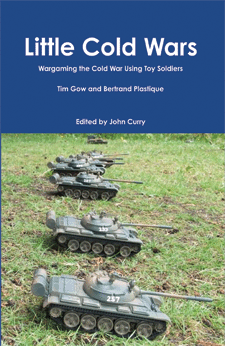The History of Wargaming Project
The project aims to make the largest possible collection of wargaming books and rules available to the modern reader. Ranging from second editions of wargaming classics, to professional wargaming rules used by the military and innovations in current wargaming.

|
|
Recreational Wargaming...Other Key Works

|
Little Cold Wars: Wargaming the Cold War Using Toy Soldiers
18 July 2016 by Tim Gow and Bertrand Plastique Edited by John Curry |
|---|---|
|
Possibly the sort of wargame H.G Wells might have developed
if he had been a child in the
1970s. But perhaps not. Written by Tim Gow
and Bertrand Plastique, the book recreates battles from the era of the
Cold War. Based on the original ideas of
H.G. Wells, this book brings the original toy soldier rules up to date
to recreate wars from the time of the Cold War onto the wargamer’s table
top or preferably, his lawn. The rules grasp the essentials
of Cold War combat; movement, close assault, direct fire, artillery and
air support. They also include additional rules to cover the
complexities of engineering, smoke and the wider air battle. They do so
in a style reminiscent of Little
Wars, just with tanks and aircraft. The book includes a full points
system as well as sample army lists from Britain to Yugoslavia For those seeking greater
complexity, there are optional rules to cover special forces, large
battles, night fighting and hidden movement. There are also five sample
scenarios to help the new Cold War warrior get started. These rules are straightforward,
but comprehensive toy soldier rules that allow the wargamer to
experience the battles, actual and potential, from those days.
|
|
|
Supplimentary Materials for Little Cold Wars
On a completely different tack but in the same order I bought a copy of Little Cold Wars: Wargaming the Cold War using Toy Soldiers by Tim Gow and Betrand Plastique. This rule set takes a nostalgic and delightfully whimsical approach to the often technologically obsessed genre of Cold War gaming. Channelling HG Wells the authors have developed hybrid of a floor game with toy soldiers to the warm glow of remembering a childhood living under the bomb. Eschewing dice for all but the Close Combat mechanisms Little Cold Wars sees a mix of scales (1/35th for toy soldiers, 1/48th for vehicles, 1/72nd for aircraft) do battle by matchstick firing cannon, dropping darts into targets and throwing scrunched up bits of paper. The thing is it really works, I can vouch for this having played an early playtest version of the rules.
Early hobby gaming all started out by using physical props to determine the results of combat, it was not until after WW2 that the dice rolling obsession took hold. It is really pleasing to see a return to these mechanisms are carefully put together is a game that relies on two lots of nostalgia, not that any gamers alive today would have played any HG Wells style games pre war so that nostalgia at least is vicarious. Being 11 and just starting at secondary school when the Berlin Wall was opened I am probably amongst the youngest gamers who remember the Cold War with any clarity, I’d be interested as to what a millennial would make of Little Cold Wars. My uncle was in the Army in Berlin at the time it was knocked down and brought a piece back for me which I still have.
[A little piece has broken off from the larger lump which gave me the idea to crush it up and mix it with plaster to create a scale model of a section of the wall to have a physical link to the place on the table top]
Either way it is a game I want to play myself, albeit all in 20mm, though I need to assemble a few props and toy cannon… and buy some silly hats… I just wish I still had my DDR flag too.